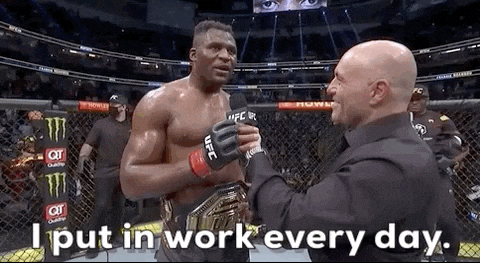Motivation is the enemy of success
It's July — 91-95% of New Year's resolutions have statistically been dropped
After my third baby, I had a profound epiphany. I'd realized that I managed to keep it together at work at the expense of my own routines and hobbies. But outside of work, my strength and health were at the bottom of the totem pole. My husband worked out regularly, while my previously athletic body had been destroyed by three back-to-back pregnancies. I'd used my pregnancies as an excuse for why I lacked the time and effort. But what I couldn't argue against was my lack of discipline.
I walked into a local boxing studio — not because I cared for boxing, but because it was walkable and had classes after 7pm — and signed up. Day by day, brick by brick, I rebuilt my body and resilience. I shut down the part of my brain that reminded me how much I hated exerting energy at night, knowing anything earlier wouldn't work with our schedules. Slowly, I added activities. I joined a soccer league and hit the pitch 1-2x a week for games.
By January, three years later, I had no health resolutions. I was unstoppable. I had even recruited a skateboarding coach so I could dominate the bowl before I turned 40.
Then I tore my ACL playing soccer.
HISTORY REPEATS ITSELF
Three months post-surgery, I ran into my neighbor — an Olympian — who noticed my limp-free walk. "Your progress looks awesome!"
I'd gone from hitting the gym or a soccer game 3-4x a week to barely managing 1,000 steps. "Are you kidding?" I told her. "I have no strength. My body has transformed.."
"Isn't that the point of being an athlete, Layla? Setbacks are never barriers. They are setbacks. Then you dominate. And re-dominate. And re-dominate."
That night, she didn't give me motivation. She gave me something better — she reminded me of my identity.
I went home and had ChatGPT put together a daily lifting plan that avoided my injury. I worked up to 10,000 steps a day. A month later, I have walked 150 miles. I'm still physically far from my peak, but mentally — I feel strong.
MOTIVATION IS THE ENEMY OF ACHIEVEMENT
When I ran into my neighbor that day, I had no motivation. I was tired, lifting a scooter and corralling a toddler in a temper tantrum while ensuring I didn't bend my knee wrong.
But it reinforced my belief that motivation is the enemy of achievement.
Motivation is a feeling. Feelings are temporary. Feelings are unreliable. When you depend on motivation to drive your actions, you're essentially gambling your future on your mood.
You don't brush your teeth because you're motivated. You don't show up to work because motivation strikes. You do these things because of who you are — a person who maintains hygiene, a professional who honors commitments.
The people you admire and aspire to be aren't more motivated than you. They've made a fundamental identity shift that you haven't made yet.
THE SCIENCE BEHIND IDENTITY VERSUS MOTIVATION
A study published in the Journal of Consumer Research tested how people respond to temptation using different language. One group was told to say "I can't" when facing unhealthy choices, while another group said "I don't."
The "I don't" group showed significantly more self-control. Why? Because "I don't" implies identity ("I am the type of person who doesn't"), while "I can't" implies constraint and deprivation.
Even more compelling: research on children learning musical instruments found that those who identified as "musicians" (rather than just "taking lessons") outperformed their peers by 400% with the same amount of practice time.
The difference? Identity.
AFFIRMATION > MOTIVATION
Motivation: Stop telling yourself "you can do this."
Affirmation: Start affirming "you are this."
This is behavioral psychology. Your actions flow from your identity, not your aspirations. When you shift from hoping you can become successful to knowing you are successful due to your habits (and have a plan for your next set of goals that you can achieve, due to your discipline), your behavior automatically aligns.
I don’t want a smoke versus I am not a smoker.
I am trying to build a business versus I am an entrepreneur.
I like challenges versus I am disciplined.
Behavior is inextricably linked to identity. Change your identity, change your behavior. Change your behavior, change your results.
GET 20% MORE, TOMORROW
Planning reduces time spent on tasks by up to 20%.
Spending 10-12 minutes planning your day results in a daily time savings of almost 2 hours, a 25% improvement in performance and productivity (The Law of Planning by Brian Tracy).
The statistic should not be very shocking — think about the last time you planned dinner at home, versus going to the market with a checklist in mind. And you had to cook without a key ingredient. Think about the last time your kids decided to hop in a pool, and you didn’t have the pool stuff on you. And you had soggy little bodies to clothe. Execution is always easier and faster with preparation.
You have to plan, even if you aren’t sure of the outcome. There is a rule that every minute spent in planning saves ten minutes in execution. The person you're becoming doesn't need perfect conditions. They don't need to "feel ready." They plan like someone who already executes consistently, because that's who they are.
When I was on crutches, I didn't plan workouts for when I "felt motivated." I planned workouts for who I am: an athlete. Athletes find ways to train, even with limitations.
LONE WOLVES STAY HUNGRY
Change is seven times more likely to happen with peer support.
Not because support makes you feel good (though it does). Because support makes you accountable to the identity you're building. When others see you as the person you're becoming, it's harder to slip back into who you were.
My Olympian neighbor didn't motivate me — she reflected back my identity when I'd forgotten it.
EXCELLENCE VERSUS MEDIOCRITY
Excellence isn't about knowing more. It's not about having better connections. It's about how you implement what you already know.
Here is an exercise — list out the difference between you and a higher achiever. Document the gap.
The gap isn't knowledge — it's implementation.
The difference between you and the image in your head is time spent.
Examples of people who put in the work every day?
Kobe Bryant practiced at 4 AM daily, obsessed over every detail of his craft for 20 years
Serena Williams started at 3 years old, practiced 6+ hours daily through childhood, dominated for over two decades
Michael Jordan was cut from high school varsity team, used rejection as fuel, became famous for outworking everyone in practice
Magnus Carlsen started at 5, studied chess 8-12 hours daily as a child, became youngest world champion at 22
Tiger Woods started at 2 years old, practiced obsessively through childhood, revolutionized the sport through work ethic
Yo-Yo Ma started at 4, practiced hours daily for decades, became the world's most celebrated cellist
Michael Phelps trained 6+ hours daily, 6 days a week for 15+ years, never missed a practice day for 5 straight years
Simone Biles trained 30+ hours per week for over a decade, redefined what's possible in the sport
Let’s make excellence tactical and not aspirational. Share an example of someone that has outworked everyone else.
The best in the world simply outworked everyone else. They didn’t get there through talent, they got there through time.
The best in the world are not made differently than you. They just execute consistently, over time.
Because mediocrity = collecting information. Excellence = executing information. Because mediocrity = waiting for perfect conditions. Excellence = creating conditions through action
Often, if you know there is something that you have to do and you aren’t doing it, it’s not because you don’t know how. It’s because you are scared about failing. Or don’t care enough. Not applying to the jobs? You may be afraid of failure. Not going above and beyond despite the gap at work? You may be fine where you are.
MOTIVATION IS KILLING YOUR DREAMS
Motivation is the enemy of success because:
It's a feeling, and feelings are temporary — but systems and identity are permanent
It makes you dependent on your mood instead of your habits
It tricks you into thinking you need to feel ready before you can act
It focuses on the outcome instead of the process that creates the outcome
It requires constant refueling, but discipline builds compound momentum
It makes you wait for inspiration instead of creating through action
It's based on future fantasies rather than present realities
It dies the moment you face real resistance, but identity persists through adversity
It teaches you to chase the feeling of wanting instead of the satisfaction of being
It makes you a prisoner of your emotions when you should be the architect of your actions
YOU NEED CONFIDENCE
Here is a tactical approach to build confidence like muscle.
First, start with identity. When you decide “I am a runner,” you automatically know what runners do — they run. When you see yourself running consistently, you get proof that you are who you say you are. Identity creates expectations. Expectations drive behavior. Behavior creates evidence. Evidence builds confidence.
And confidence must be built intrinsically. Psychologists Edward Deci and Richard Ryan proved what high performers already know: offering people extrinsic rewards for behavior that is intrinsically motivated undermines the intrinsic motivation as they grow less interested in it. Chase external validation — likes, praise, likes, money — and you kill your drive. Intrinsic motivation pertains to activities done "for their own sake," while extrinsic motivation aims toward outcomes external to the behavior itself. When you need others to tell you you're good, you're already losing. Build confidence from your own standards, your own progress, your own identity. That's what lasts.
YOUR ANTI-MOTIVATION OPERATING SYSTEM
Identity first, action second.
Plan like you already execute
Execute without emotion
IN CONCLUSION
It's July, and 95% of people have abandoned their resolutions. But you're not most people.
You're not someone who hopes to become successful — you're someone who is successful and acts accordingly.
You're not someone who waits for motivation — you're someone who executes regardless of feelings.
You're not someone who makes excuses — you're someone who finds ways.
The question isn't whether you can change.
The question is: Are you ready to become who you already are?
Ready to make the identity shift? Start with one action today that aligns with who you're becoming. Not who you hope to be—who you already are.
Separately — I hit 5,000 Subs today. I am so grateful. 5k was a goal I had set for December. Every time you send a piece to a friend, comment, like — I notice and appreciate. Thank you all <3








There is so much growth in knowing that you will show up because you’re who you are and then being able to take a rest because you’re a human. The marriage of identity, discipline and trusting your body’s safety is goals! I’m working on learning that discipline is developing balance on and off the mat, honoring my body as a martial arts via food planning, saying I don’t need that extra food/alcohol but I do need extra sleep, honoring that some days look like being on the mat for 2 hours and some day look like being a full time financial advisor and Mom. Having the discipline to honor yourself and trust yourself through it all ….work in progress!
Honestly look forward to reading your substacks so much. I am training to become a Neuro Linguistic Programming Practioner and this reminded me of one of the models we just learned: six logical levels to understand and facilitate change. These levels, often visualized as a hierarchy, include Environment, Behavior, Capabilities, Beliefs and Values, Identity, and Purpose. Changes at higher levels can impact lower levels, while changes at lower levels may not always affect higher ones!
So yeah identity will change everything else! ❤️